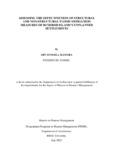Assessing the effectiveness of structural and non-structural flood mitigation measures of Bushrod island’s unplanned settlements

View/Open
Date
2023-07Publisher
Brac UniversityAuthor
Kamara, Abu SumailaMetadata
Show full item recordAbstract
Flooding poses a significant threat to the inhabitants of unplanned settlements on Bushrod Island in Monrovia, Liberia. Although flood risk there are mitigation strategies are in place, their effectiveness in reducing the impacts of flooding remains unclear. This study aims to assess the efficacy of both structural and non-structural flood risk mitigation measures in minimizing the dangers and effects of flooding on Bushrod Island. The research objectives are to identify and categorize flood hazards, evaluate the effectiveness of flood mitigation measures, and propose improvements to address specific flood risks. By answering research questions about flood hazards, the measures’ effectiveness, influencing factors, and potential improvements, this study will provide valuable insights into flood risk reduction strategies for similar contexts elsewhere.
This research sheds light on how well these precautions work to reduce flood risks in different contexts. The research incorporates couple of mixed tools and techniques such as primary and secondary data, and qualitative and quantitative analysis. The research also used survey and interview as data collection tools using the combination of purposive and stratified random sampling. The nature of the research is analytical and the purpose is centered on fundamental research tactics while the research design is conclusive.
Since the long-term effectiveness of the available mitigation measures in the study area remain uncertain, the study will focus on identifying the hazard risks, vulnerabilities, and assess the immediate impact of flood mitigation measures, but also investigate the durability of both structural and non-structural measures over time which is essential to understanding their continued efficacy.
Additionally, understanding the extent and nature of flood damage is essential to comprehensively evaluate the impact of the assessed measures. It will help in determining the economic losses, and social implications faced by the communities during flood events. This data is vital for decision-makers and stakeholders to prioritize investment in appropriate flood risk reduction strategies.
By addressing these research gaps, the researcher can offer more comprehensive and practical recommendations for improving the existing and new flood risk reduction strategies in the study area and potentially inform flood risk management practices in other similar contexts nationally.
